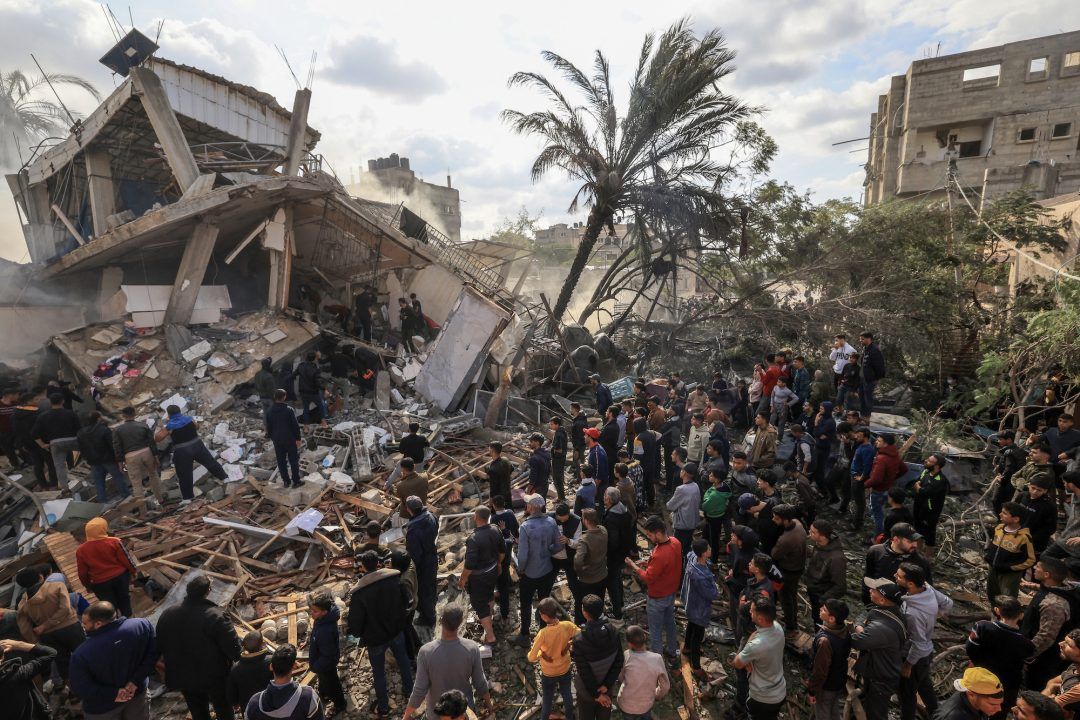- Home
- War in the Middle East
- Israel Takes Control of Rafah Crossing after Heavy Bombardments

©Palestinians gather amid the rubble of destroyed buildings following an Israeli bombardment on December 14, 2023, in Rafah, in the southern Gaza Strip. (Photo by Mahmud Hams / AFP)
Israel took control of the Rafah crossing overnight Tuesday, ahead of an expected, and widely-condemned, invasion, as involved parties hope to agree a truce deal.
Israeli forces took control of the Palestinian side of the Rafah crossing in the southern Gaza Strip on the border with Egypt, Israel's Army Radio reported on Tuesday.
The representative of the Gaza Border Crossing Authority told Reuters that the presence of Israeli tanks had led to the closure of the Rafah crossing.
Meanwhile, Israel was carrying out strikes on this Gazan city as it sought to put "pressure" on Hamas ahead of talks in Egypt on Tuesday aimed at sealing a truce proposal endorsed by the militants.
After having vowed for weeks to push into the southern border town, Israel called on Monday for Palestinians in eastern Rafah to leave for an "expanded humanitarian area" ahead of a ground incursion.
An AFP correspondent in the city reported heavy bombardment throughout the night, while the Kuwaiti hospital there said Tuesday in an updated toll that 11 people had been killed and dozens of others injured in Israeli strikes.
Hamas said Monday evening that it had informed Egypt and Qatar of its "approval of their proposal regarding a ceasefire" in the seven-month-old war, prompting cheering crowds to take to the streets of Rafah.
Israeli Prime Minister Benjamin Netanyahu's office said the proposal "is far from Israel's essential demands", but the government would send negotiators for talks "to exhaust the potential for arriving at an agreement".
Close Israeli ally the United States said it was "reviewing" the Hamas response.
Hamas member Khalil al-Hayya told the Qatar-based Al Jazeera news channel that the proposal includes a complete Israeli withdrawal from Gaza, the return of Palestinians displaced by the war and a hostage-prisoner exchange, with the goal of a "permanent ceasefire".
Renewing the call for people to leave Rafah late Monday, Israeli military spokesman Daniel Hagari said "aircraft targeted more than 50 terror targets in the Rafah area" throughout the day.
Hamas ally Islamic Jihad said Monday night that it had fired rockets from Gaza towards southern Israel in response.
International alarm has been steadily building about the consequences of an Israeli ground invasion of Rafah.
An Israeli incursion into the city would be "intolerable", UN Secretary-General Antonio Guterres said Monday, calling on Israel and Hamas "to go an extra mile" to reach a ceasefire deal.
Egypt's foreign ministry warned of "grave humanitarian risks" for the more than one million Gazans sheltering there and urged Israel to "exercise the utmost restraint".
Jordanian King Abdullah II asked US President Joe Biden in talks Monday to intervene to stop a "new massacre" in Rafah.
In a conversation with Netanyahu on Monday, Biden restated "his clear position" opposing an invasion of the city, the White House said.
The Hostage Families and Missing Families Forum said in a statement after Hamas's announcement Monday that "now is the time for all that are involved to fulfil their commitment and turn this opportunity into a deal for the return of all the hostages".
Hamas said Israel was planning a large-scale offensive "without regard for the ongoing humanitarian catastrophe"or for the fate of hostages held there.
Israel said its "limited" and temporary Rafah evacuation order aimed "to get people out of harm's way".
The Palestinian Red Crescent reported "thousands" of Gazans leaving the city's east.
Israel's military in a statement urged those in eastern Rafah to head for the "expanded humanitarian area" at Al-Mawasi on the coast.
But aid groups said Al-Mawasi was not ready for such an influx.
Asked how many people should move, an Israeli military spokesman said: "The estimate is around 100,000 people."
The Red Crescent said the designated evacuation zone hosts around 250,000 people, many of them already uprooted from elsewhere.
Palestinian Abdul Rahman Abu Jazar, 36, said the area "does not have enough room for us to make tents" because it is already full.
"Where can we go?" he asked.
With AFP
Israeli forces took control of the Palestinian side of the Rafah crossing in the southern Gaza Strip on the border with Egypt, Israel's Army Radio reported on Tuesday.
The representative of the Gaza Border Crossing Authority told Reuters that the presence of Israeli tanks had led to the closure of the Rafah crossing.
Meanwhile, Israel was carrying out strikes on this Gazan city as it sought to put "pressure" on Hamas ahead of talks in Egypt on Tuesday aimed at sealing a truce proposal endorsed by the militants.
After having vowed for weeks to push into the southern border town, Israel called on Monday for Palestinians in eastern Rafah to leave for an "expanded humanitarian area" ahead of a ground incursion.
An AFP correspondent in the city reported heavy bombardment throughout the night, while the Kuwaiti hospital there said Tuesday in an updated toll that 11 people had been killed and dozens of others injured in Israeli strikes.
Hamas said Monday evening that it had informed Egypt and Qatar of its "approval of their proposal regarding a ceasefire" in the seven-month-old war, prompting cheering crowds to take to the streets of Rafah.
Israeli Prime Minister Benjamin Netanyahu's office said the proposal "is far from Israel's essential demands", but the government would send negotiators for talks "to exhaust the potential for arriving at an agreement".
Close Israeli ally the United States said it was "reviewing" the Hamas response.
Hamas member Khalil al-Hayya told the Qatar-based Al Jazeera news channel that the proposal includes a complete Israeli withdrawal from Gaza, the return of Palestinians displaced by the war and a hostage-prisoner exchange, with the goal of a "permanent ceasefire".
'Intolerable' invasion
Renewing the call for people to leave Rafah late Monday, Israeli military spokesman Daniel Hagari said "aircraft targeted more than 50 terror targets in the Rafah area" throughout the day.
Hamas ally Islamic Jihad said Monday night that it had fired rockets from Gaza towards southern Israel in response.
International alarm has been steadily building about the consequences of an Israeli ground invasion of Rafah.
An Israeli incursion into the city would be "intolerable", UN Secretary-General Antonio Guterres said Monday, calling on Israel and Hamas "to go an extra mile" to reach a ceasefire deal.
Egypt's foreign ministry warned of "grave humanitarian risks" for the more than one million Gazans sheltering there and urged Israel to "exercise the utmost restraint".
Jordanian King Abdullah II asked US President Joe Biden in talks Monday to intervene to stop a "new massacre" in Rafah.
In a conversation with Netanyahu on Monday, Biden restated "his clear position" opposing an invasion of the city, the White House said.
Thousands leaving
The Hostage Families and Missing Families Forum said in a statement after Hamas's announcement Monday that "now is the time for all that are involved to fulfil their commitment and turn this opportunity into a deal for the return of all the hostages".
Hamas said Israel was planning a large-scale offensive "without regard for the ongoing humanitarian catastrophe"or for the fate of hostages held there.
Israel said its "limited" and temporary Rafah evacuation order aimed "to get people out of harm's way".
The Palestinian Red Crescent reported "thousands" of Gazans leaving the city's east.
Where can we go?
Israel's military in a statement urged those in eastern Rafah to head for the "expanded humanitarian area" at Al-Mawasi on the coast.
But aid groups said Al-Mawasi was not ready for such an influx.
Asked how many people should move, an Israeli military spokesman said: "The estimate is around 100,000 people."
The Red Crescent said the designated evacuation zone hosts around 250,000 people, many of them already uprooted from elsewhere.
Palestinian Abdul Rahman Abu Jazar, 36, said the area "does not have enough room for us to make tents" because it is already full.
"Where can we go?" he asked.
With AFP
Read more



Comments